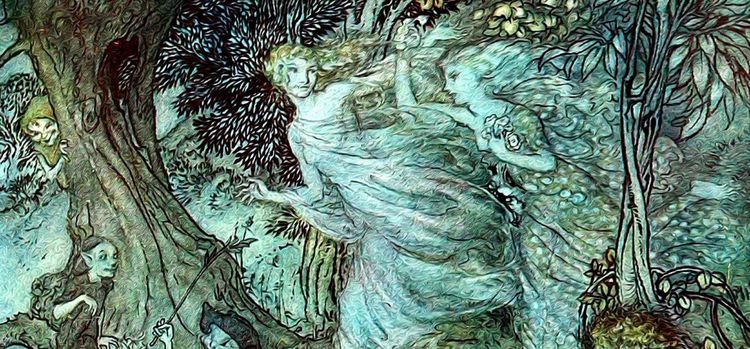Ghost feelings: Trauma is weird

Trauma is so strange. Sometimes I want to write about it and sometimes I don't. When I do, the motivation isn't healing, particularly, though I believe it can be very healing under the right circumstances.
It's to try and express how bloody weird it is; to just share all these bizarre experiences - not of what happened to me, but the after effects.
I won't try and do a trauma 101, but here's just one example: emotions that it wasn't safe to feel at the time of a traumatic experience because they might have impeded your fight/flight/freeze response can stay kind of frozen inside you.
When you're out of danger they start to 'melt', and seep out. But of course they're disconnected from their source, so you can find yourself facing overwhelming emotions without any idea why. You can walk around for years (as I did) rocked by sudden, inexplicable rages, crushing sadness, or intense terror, with no clue where they're coming from except a chill in your heart that feels like its always been there.
The nickname I gave these old emotions once I was able to recognise them for what they were is "ghost feelings", which made more sense and felt friendlier to me than "emotional flashbacks". After all, they're just feelings that need to be released, like a ghost that needs to tell its tale before it can be laid to rest. Doesn't mean they're not very frightening, but with a lot of time and practice I have learned to welcome them. (Most times. Not always.)
Throughout my recovery work I've used images and analogies like these to articulate these weird experiences to myself. Thankfully my therapist* rolls with it. So she knows what I mean when I talk about "black hole feelings", or a "robot day", or when I feel like a "haunted suit of armour". Looking back, I can see I've always done this, all the way back into my early childhood: used the language of science fiction, fantasy, and horror to understand and describe my internal experiences.
(There's a chicken and egg question there I guess. Do I love fantastic stories because they they help me make sense of myself? Or do I make sense of myself using fantastic stories because I already love them? To which my answer is: shrug.)
I feel an impulse to write stories about trauma so that I have something I can point to and say "it's like this, it feels like this", as if people are desperate to know. I suppose I am trying to connect.
It's also my definite hope that someone might read a story I write and recognise something their own experience in it and perhaps find it useful to have that image, whether that's because it helps them make sense of their own experiences, or just because it shows that they're not alone.
Dealing directly with descriptions of the psychological or physical effects of complex relational trauma doesn't seem to work for me. It either sounds like a textbook, or a list of physical sensations which are illegible without the story around them. When I use speculative elements and metaphor to approach writing about trauma, I think I can share its full meaning much more clearly.
For example, if I tell you that one day a sinkhole opened up inside me and swallowed my heart**, or that my emotion chip malfunctioned, or that I felt haunted by someone from my past, I believe that communicates my experience more deeply and more vividly than any other means I have at my disposal.
There are many great writers and creators using the same approach to write about trauma with much more skill than me. One of my favourites is "That Story Isn't The Story" by John Wiswell, which appeared in Uncanny Magazine and features wounds that literally won't heal, and bloodstains which resonated with me as a way to visualise pain and shame.
I also loved "I Wear My Spiders In Remembrance Of Myself" by Kel Coleman, which appeared in Apparition Lit, and uses spiders to embody the pure horror and trauma of racism, as well as highlight the cruelty of the cultural expectation that BIPOC should bear that pain quietly and discreetly.
"Sand" by Jasmin Kirkbride, which appeared on Tor.com, uses the unforgettable, uncomfortable image of a mouthful of sand to explore the experience of intergenerational trauma.
Some of my favourite TV shows follow a similar tack. In Russian Doll, trauma is a time loop. In Steven Universe: Futures it's a giant pink bubble. In Doom Patrol it's... well it's a whole bunch of things. These aren't my images or my experiences, they resonate and illuminate the things that are the same and the things that are different. They inspire me to want to keep trying to share my own weird experiences.
Although I want to write about what trauma feels like for me, it's not easy. It's painful to write about (even writing this physically hurt a little at first) and I still feel ashamed sometimes, the shame most victims share. I am afraid people will demand the details. And I worry that because of mental health stigma relating my experiences will make people afraid of me.
And sometimes - a lot of the time - I don't want to write about it at all. Instead I get excited writing about moss monsters or friendly giants. That's fine by me, because my experience of trauma and recovery is a story I want to tell, but it isn't the only one.
*I just want to acknowledge how privileged I am to be able to work with a therapist. In my view, high quality psychotherapy and other forms of psychological support should be available free for everyone at any time, along with all other forms of care, but we're miserably far away from that. I shouldn't be lucky but I am.
**I wrote the sinkhole story! It's in The Dead Inside anthology published by Dark Dispatch.
A few resources
- My writing about trauma self care blog post series
- Upcoming workshops on writing about trauma
- Emma McAdam - Therapy In A Nutshell: How Emotions Can Get Trapped In Your Body
- Sarah Gailey - SFWA: On Trauma-Informed Writing
- Lisa Cooper Ellison - Three Things To Ask Yourself Before Writing About Trauma
- Yolande House - How To Write About Trauma In A Safe(r) Way





Member discussion